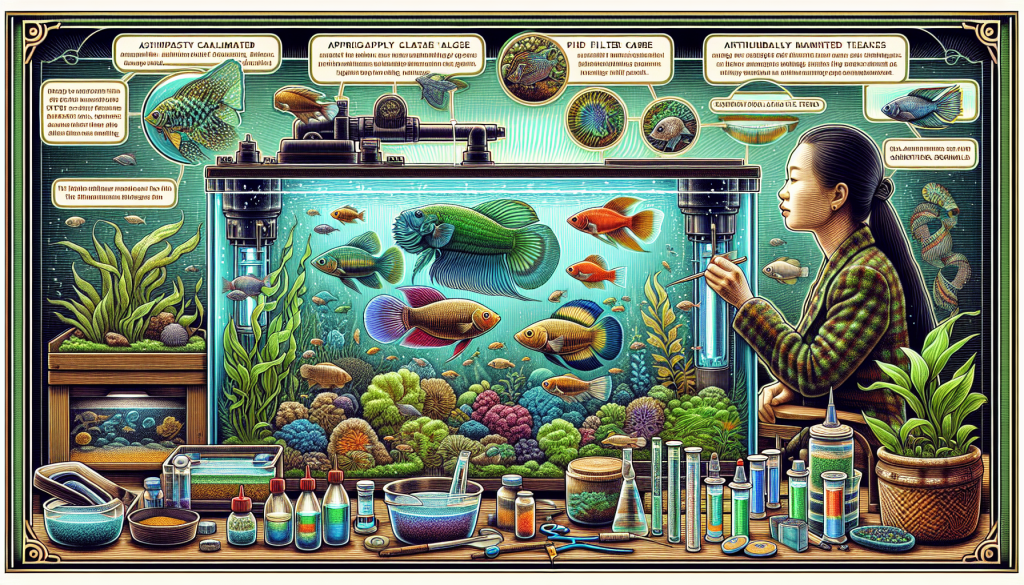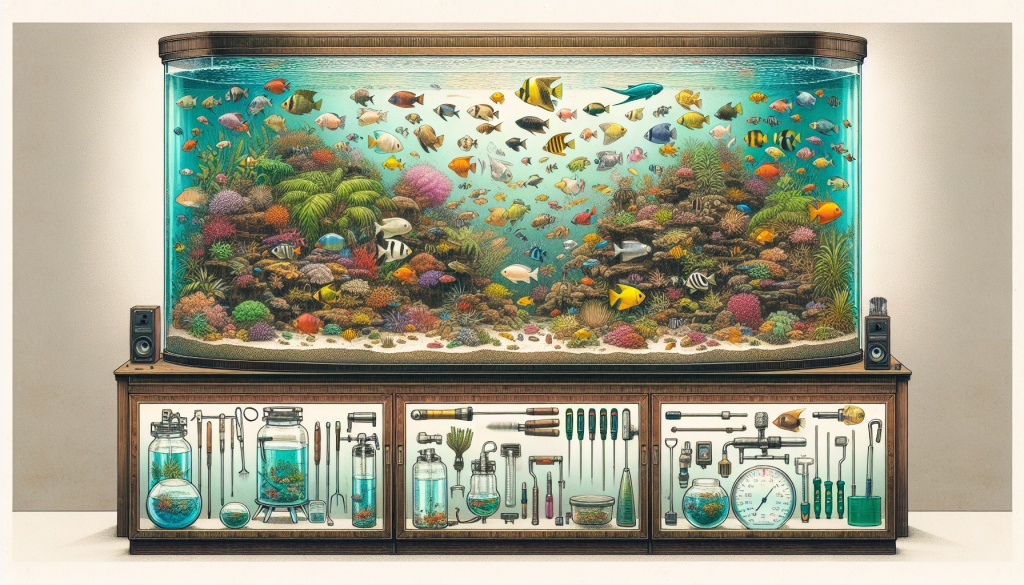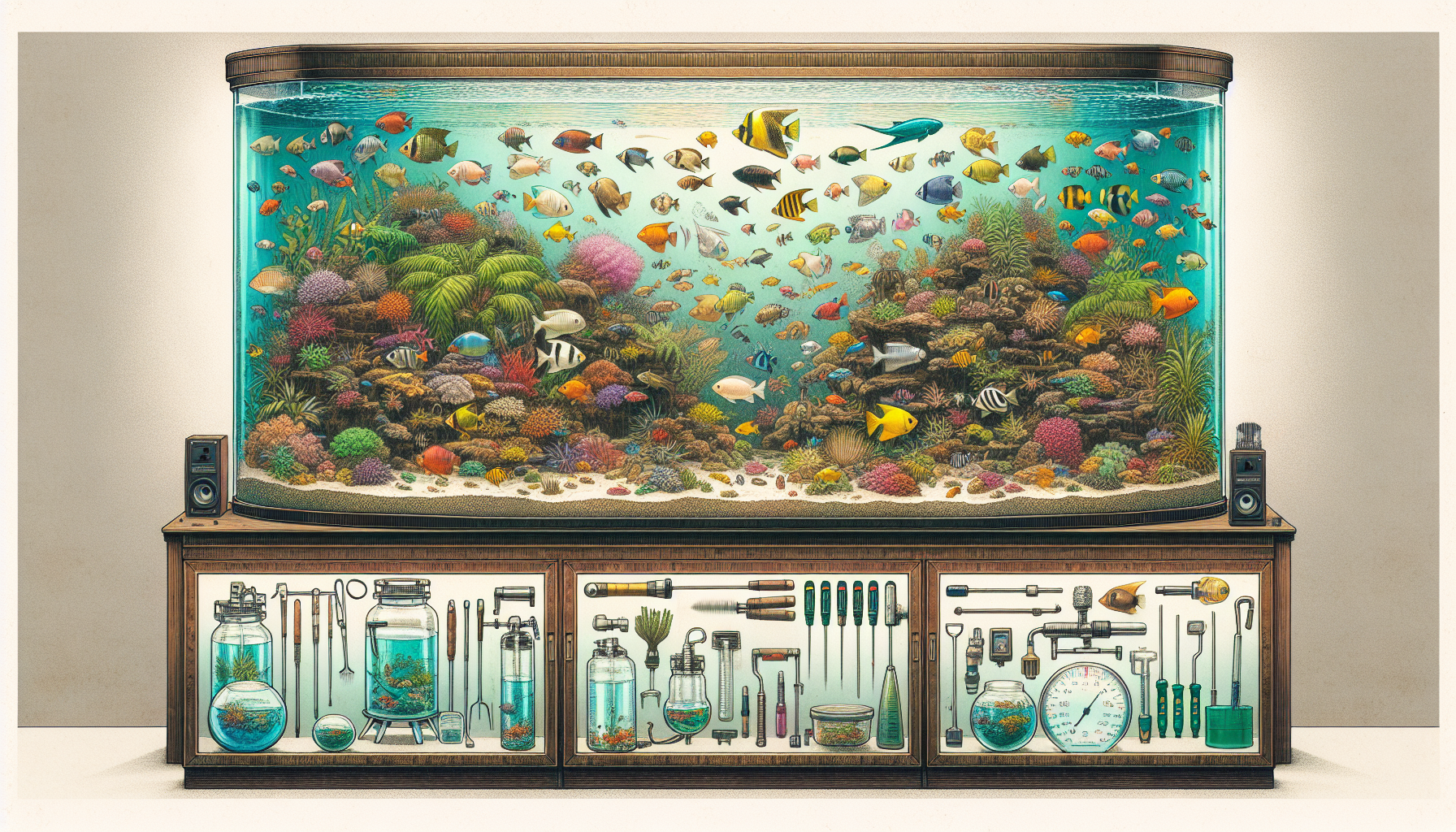Are you considering getting tropical fish as pets but need to know if they are challenging to care for? Many people assume that tropical fish require extensive maintenance and expertise, but this article aims to debunk that myth. By providing essential information and practical tips, you’ll discover that taking care of tropical fish can be a rewarding and enjoyable experience for beginners and experienced fish enthusiasts. Whether you’re new to fishkeeping or looking to expand your aquatic family, get ready to explore the fascinating world of tropical fish care.
Are tropical fish hard to take care of?
Caring for tropical fish is manageable and rewarding with proper knowledge and preparation. Selecting compatible species, setting up the right tank environment, maintaining water quality, and providing a balanced diet are crucial steps. Regular monitoring and addressing any health or behavioral issues ensure a thriving aquarium. With dedication and research, both beginners and experienced enthusiasts can enjoy the beauty and diversity of tropical fishkeeping.
Choosing the Right Tropical Fish
Variety of Tropical Fish
When choosing tropical fish for your aquarium, you will be amazed at the countless options available. The variety of tropical fish species is remarkable, with vibrant colors, unique patterns, and diverse sizes. Whether you prefer the dynamic beauty of neon tetras, the graceful movements of angelfish, or the vibrant hues of guppies, there is undoubtedly a tropical fish that will captivate your heart.
Compatibility of Fish Species
While the vast array of tropical fish species is undoubtedly fascinating, it is crucial to consider their compatibility when selecting fish for your aquarium. Not all fish species can coexist harmoniously, and mixing incompatible fish can lead to stress, aggression, and potential harm to your tank’s inhabitants. Before making any decisions, research the compatibility of the fish you are interested in to ensure a peaceful and thriving community in your aquarium.
Fish Behavior and Temperament
Understanding the behavior and temperament of tropical fish is essential for creating a harmonious and stress-free environment in your aquarium. Some species may be more social and peaceful, while others exhibit territorial or aggressive behavior. It is vital to consider the disposition of the fish you plan to keep to ensure their compatibility with other tank mates. Observing the behavior of fish before purchasing them can provide valuable insights into their compatibility with other species in your aquarium.
Setting Up the Aquarium
Selecting the Right Tank Size
Choosing the appropriate tank size is paramount to creating a suitable home for your tropical fish. The tank’s capacity should be determined by the number and size of the fish species you intend to keep. Providing sufficient space for the fish to swim and thrive comfortably is crucial. Larger tanks generally offer more stability and provide a buffer against rapid water parameter changes, making them easier to maintain in the long run.
Aquarium Filtration and Water Quality
Maintaining proper filtration and water quality is vital for the health and well-being of your tropical fish. A reliable filtration system helps remove waste, toxins, and uneaten food from the water, ensuring optimal conditions for your fish. Regular water testing is essential to monitor ammonia, nitrite, nitrate levels, pH, alkalinity, and hardness. Understanding your chosen fish species’ specific water quality requirements will guide you in establishing an adequate filtration system and maintaining pristine water conditions.
Proper Lighting and Heating
Appropriate lighting and heating in your aquarium is essential to create a conducive environment for your tropical fish. Adequate lighting enhances the beauty of your fish and promotes the growth of beneficial bacteria and plants within the tank. Similarly, maintaining the proper temperature through a reliable heater is crucial to ensure the comfort and well-being of your fish. Research your chosen fish species’ lighting and heating requirements to establish optimal conditions for their growth and happiness.

Feeding Tropical Fish
Understanding Nutritional Needs
Understanding the nutritional needs of your tropical fish is vital to providing a well-balanced diet. Different fish species may require different types of food, such as flakes, pellets, frozen or live food. It is essential to research and understand the specific dietary requirements of your chosen fish species to ensure they receive the necessary vitamins, minerals, and proteins for optimal growth and vibrant health.
Types of Fish Food
A wide range of fish food is available in the market, including flake, pellet, freeze-dried, and frozen food. Each type has its advantages and disadvantages, and it is essential to offer a varied diet to promote your tropical fish’s overall health and well-being. Combining different kinds of food will provide a balanced nutritional intake and prevent dietary deficiencies.
Feeding Frequency and Portion Size
Establishing the right feeding frequency and portion size for your tropical fish is crucial to prevent overfeeding or underfeeding. Most tropical fish species require small, frequent daily meals, mimicking their natural feeding habits. It is essential to observe the feeding behavior of your fish and adjust the amount of food given accordingly. Remember that overfeeding can lead to poor water quality and health problems, while underfeeding can result in malnutrition and stunted growth.
Maintaining Water Conditions
Water Testing and Monitoring
Regular water testing and monitoring are vital to maintain optimum water conditions for your tropical fish. Testing for ammonia, nitrite, nitrate, pH, and other parameters will allow you to promptly detect any fluctuations or imbalances. Keeping a log of test results will help you identify patterns or trends over time and swiftly address water quality issues.
Water Change and Cleaning
Regular water changes are essential for maintaining a healthy aquarium environment. Partial water changes, typically replacing 10-20% of the tank volume, should be conducted regularly to remove accumulated waste and excess nutrients from the water. Additionally, cleaning the tank’s interior surfaces, including gravel, ornaments, and filters, will prevent debris buildup and promote a clean and healthy environment for your tropical fish.
Maintaining Proper pH Levels
Monitoring and maintaining proper pH levels in your aquarium is crucial for the well-being of your tropical fish. Different fish species have specific pH requirements, and adjusting and maintaining the pH within the suitable range for your chosen fish is essential. Consistently high or low pH levels can cause stress and health issues, and it is crucial to research the specific pH needs of your fish species and take appropriate measures to maintain the optimal range.

Maintaining a Healthy Aquarium
Monitoring Fish Behavior and Health
Regularly monitoring your fish’s behavior and health is essential for detecting any potential issues or illnesses early. Watch for swimming patterns, appetite, or appearance changes, as they can indicate underlying health concerns. Familiarize yourself with the typical behavior and appearance of your chosen fish species to better recognize deviations from the norm.
Preventing and Treating Diseases
Prevention is critical to maintaining a healthy aquarium. Introduce healthy fish to your tank to prevent diseases and maintain optimal water conditions. However, despite your best efforts, fish may still become ill. In such cases, promptly identifying the disease and seeking appropriate treatment is crucial to prevent its spread to other tank inhabitants. Consult a knowledgeable aquatic veterinarian or a reputable fish store for guidance on disease prevention and treatment options.
Managing Algae Growth
Algae growth is a common occurrence in aquariums, and managing it effectively is essential to maintain your tank’s aesthetic appeal and health. Maintaining a balance in your aquarium through proper lighting, regular water changes and adequate algae-eating fish or invertebrates can help control excessive algae growth. Additionally, adjusting the light duration and intensity can prevent algae from overtaking the tank, creating a more visually appealing and thriving environment for your tropical fish.
Providing Suitable Habitat
Decorating the Aquarium
Creating an appealing and stimulating environment for your tropical fish is vital to their well-being. Decorating your aquarium with elements such as rocks, driftwood, and caves can replicate the fish’s natural habitat and provide them with hiding spots and territories. Carefully select safe and suitable decor for your fish, avoiding any sharp edges or materials that may leach harmful substances into the water.
Adding Plants and Hiding Spots
Live plants enhance the visual appeal of your aquarium and provide numerous benefits for your tropical fish. They serve as natural filtration, absorbing nitrates and giving oxygen while offering hiding spots and additional food sources for some fish species. Research the specific plant species compatible with your chosen fish and ensure they receive adequate lighting and nutrients to thrive.
Creating a Natural Environment
Recreating a natural environment in your aquarium can contribute to your tropical fish’s overall well-being and happiness. Consider replicating elements such as rocks, sand, driftwood, and plants that mimic their native habitats. Providing hiding spots, territories, and swimming spaces that resemble their natural surroundings can reduce stress and create a more engaging and biologically diverse ecosystem for your fish.
Dealing with Aggression and Territorial Behavior
Recognizing Aggressive Species
Some fish species are inherently more aggressive and territorial than others. Researching the temperament and aggression levels of your chosen fish species before adding them to your aquarium is essential. Identify any potential conflict between fish species that may lead to aggressive behavior and take the necessary precautions to prevent harm to other tank inhabitants.
How to Handle Aggression
When dealing with aggression in an aquarium, taking appropriate measures to restore peace and harmony is crucial. Providing ample hiding spots, territories, and visual barriers can help alleviate aggression by allowing fish to establish their own spaces. However, if aggression persists, consider rehoming or separating conflicting fish to ensure the overall well-being of your aquarium community.
Separating Conflicting Fish
In some cases, separating conflicting fish may be necessary to prevent ongoing aggression and potential harm. Utilizing dividers or separate tanks may create a safe and stress-free environment for all fish. Monitoring the behavior of your fish closely and consulting with experts when needed will guide you in making the best decisions for maintaining a harmonious and peaceful aquarium.
Breeding Tropical Fish
Understanding Fish Reproduction
Breeding tropical fish can be a rewarding experience for aquarium enthusiasts. Understanding your chosen fish species’ reproductive behaviors and requirements is vital for successful breeding. Some species may require specific water conditions, nesting sites, or breeding rituals. Research the particular breeding requirements of your fish species to create optimal conditions for successful reproduction.
Creating Breeding Conditions
Creating suitable breeding conditions involves replicating the natural environment and providing an adequate setup for fish eggs and fry to thrive. Often, this includes creating specific water parameters, offering suitable nesting sites, and providing optimal nutrition for the breeding fish. Consulting breeding guides specific to your chosen fish species will ensure you meet their unique breeding requirements.
Caring for Fry (Baby Fish)
Once the fry hatch, proper care and nutrition are crucial for their survival and healthy growth. Fry may require exceptional food, such as infusoria or newly hatched brine shrimp, appropriate for their size and development stage. Additionally, ensuring stable water conditions and protecting the fry from potential predators in a separate nursery tank will promote their overall well-being and increase their chances of thriving.
Keeping a Balance in the Ecosystem
Maintaining a Balanced Fish Population
Ensuring a balanced fish population is vital for the overall health and stability of the aquarium ecosystem. Overcrowding can create stress, competition for resources, and poor water quality. Research your chosen fish species’ adult size and behavior to determine suitable stocking levels and avoid overcrowding. Regular monitoring and potential rehoming or trading of fish can help maintain a balanced and thriving aquarium community.
Controlling Waste and Ammonia Levels
Proper waste management is crucial for maintaining optimal water conditions. Overfeeding, excessive fish waste, and decaying organic matter can contribute to ammonia buildup, which is toxic to fish. Regular water changes, adequate filtration, and diligent cleaning practices will help control waste and ammonia levels, resulting in a healthier and more stable aquatic environment.
Promoting Beneficial Bacteria Growth
Beneficial bacteria play a critical role in maintaining a balanced aquarium ecosystem. These bacteria help break down waste, ammonia, and nitrites, converting them into less harmful substances. Promoting beneficial bacteria growth can be achieved through proper tank cycling, establishing a biological filter, and avoiding harsh chemicals that may harm or kill these essential microorganisms.
Common Mistakes to Avoid
Overfeeding and Poor Nutrition
One of the most common mistakes in tropical fish care is overfeeding. Overfeeding can lead to excessive waste, poor water quality, and obesity in fish. Feeding your fish appropriately and providing a balanced diet that meets their nutritional needs is crucial. Monitoring their appetite and adjusting portion sizes will help avoid overfeeding and ensure optimal nutrition.
Neglecting Water Quality
Neglecting water quality is another common mistake that can lead to numerous health issues for tropical fish. Failing to maintain proper filtration, water changes, and water parameters can result in high ammonia, nitrite, and nitrate levels, leading to stress, diseases, and death. Regular testing, water changes, and proper maintenance practices are essential for ensuring a healthy and thriving aquarium environment.
Lack of Research and Knowledge
Insufficient research and knowledge about specific fish species’ requirements and care needs can lead to significant challenges and potential harm to your tropical fish. Before embarking on your tropical fishkeeping journey, invest time in understanding the particular needs and behaviors of the fish species you are interested in. This will enable you to make informed decisions, create appropriate habitats, and provide the care necessary for their well-being.
In conclusion, tropical fish can make delightful and captivating additions to any aquarium. You can ensure a thriving and vibrant aquarium environment by choosing suitable fish species, setting up the aquarium correctly, providing suitable habitat, maintaining water conditions, and promptly addressing any behavioral or health issues. Take the time to research, educate yourself, and embrace the joys of tropical fishkeeping. With the proper knowledge and care, you’ll be rewarded with a beautiful and harmonious underwater world for years to come.
Final Thoughts: Are Tropical Fish Hard to Take Care Of?
In conclusion, keeping tropical fish as pets is far from the daunting task many assume it to be. With the correct information and dedication, anyone can create a thriving aquatic environment for these vibrant creatures. The journey into tropical fish care can be enriching, from selecting compatible species and setting up the perfect tank to ensuring proper nutrition and maintaining ideal water conditions.
Remember, the key to a successful aquarium lies in understanding the unique needs of your aquatic pets and committing to their well-being. Whether you’re a novice eager to dive into the world of fishkeeping or an experienced enthusiast looking to expand your aquatic family, the fascinating world of tropical fish offers endless possibilities for exploration and enjoyment. Embrace the learning curve, and you’ll soon find that caring for tropical fish is manageable and immensely gratifying, offering a slice of the underwater world right in your living room.

My name is James Gheen, and I am thrilled to welcome you to Tropical Fish Farmers, the ultimate destination for everything related to tropical fish breeding. As an avid underwater enthusiast, I am dedicated to sharing my knowledge and experience to help you successfully breed and care for tropical fish. Whether you’re a beginner starting your aquarium journey or a seasoned breeder looking to expand your knowledge, my website has something for everyone. Dive into our extensive library of articles, tutorials, and videos covering various topics to enhance your breeding success. Join me in our vibrant community and let’s contribute to responsible fish breeding and conservation efforts together. Discover Tropical Fish Farmers and become part of our global community today.

